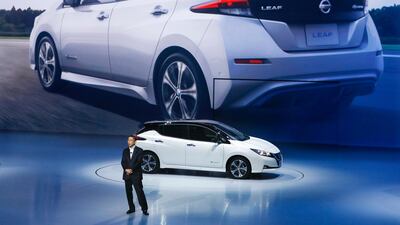Nissan unveiled a new version of its Leaf electric car after delaying its launch amid the shock arrest of former chairman Carlos Ghosn.
The new model, launched Tuesday in Las Vegas, narrows the driving-range gap versus Tesla’s Model 3 and General Motors' Chevrolet Bolt.
The Japanese carmaker called off key events in the wake of the scandal involving Mr Ghosn, who was the architect of Nissan’s electric-car vision and its pact with Renault SA and Mitsubishi, the world’s biggest auto alliance. Mr Ghosn was arrested November 19 in Japan on alleged financial crimes. He remains in a Tokyo prison as prosecutors build their case.
The auto industry’s increasing focus on automation and new-energy vehicles, along with the aggressive push into both areas by Tesla and scores of startups from China to Germany, has added to Nissan’s challenges.
The Leaf e+ boasts a more energy-dense battery that extends its range by about 40 per cent, to as much as 226 miles (363 kilometres). That compares with the 220- to 310-mile range for Tesla’s Model 3, which starts at $44,000 (Dh161,500), and the 238-mile range on the $36,620 Chevrolet Bolt. While the Leaf starts at about $30,000 in the US, Nissan isn’t releasing the price of the e+ until it’s closer to starting sales this spring.
_______________
Read more:
Former Nissan boss Carlos Ghosn says he is 'wrongly accused' in first court appearance
Carlos Ghosn's jail detention extended again by Tokyo court
Former Nissan executive Kelly leaves jail on bail after a month of detention
_______________
Nissan has sold more than 380,000 Leaf vehicles globally since its model first went on sale in 2010, with over 128,000 in the US. The new Leaf will be available at dealerships in Japan starting this month, followed by the US, then Europe in mid-2019, Nissan said in a statement.

